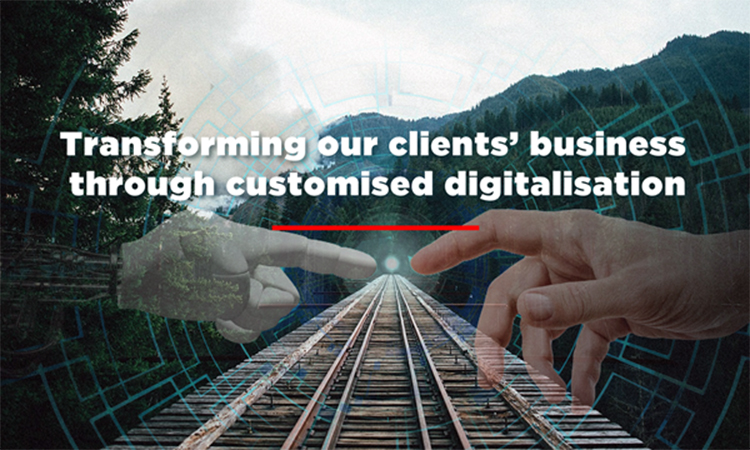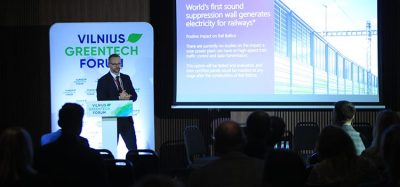How digitalisation can support the transportation of dangerous goods by rail
Posted: 10 November 2020 | Božica Radoš | No comments yet
In an exclusive interview with Global Railway Review, Božica Radoš, CEO of Venit ExAnte Ltd, discusses the significance of digitalisation in supporting the transportation of dangerous goods by rail, particularly in the face of the COVID-19 crisis, during which there has been a huge increase in the volume of hazardous waste.


Credit: Venit ExAnte Ltd
How does Venit ExAnte support the rail transportation industry by providing consulting and design services?
The 21st century has seen an overall transformation in the way that humans communicate and do business. The rail transportation industry is still the best option for moving volumes in bulk in a short period of time, over great distances, efficiently and with approximately eight times lower CO2 emissions, in respect to LKW transport. This fact, in combination with the faster and more efficient digitalisation of the whole human civilisation, has created a need for tailor-made solutions for each client in the railway industry.
Venit ExAnte, in the past decade, has established itself as a definition of the philosophy: “Through optimised planning, we prevent excess planning” – giving clients an optimal service, which is constantly enhanced via communication with the client, with one of the primary goals being maximum financial efficiency. That is the first and foremost mission of digitalisation, in the abstract sense.
Digitalisation is an imperative of sustainability and is at the heart of a smart industry, including the transport industry, which literally ‘drives’ other industries.
To make the above-mentioned philosophy work in practice we need to, by definition, talk about software solutions. Digital transformation is a burning theme and, increasingly, the question is not “Should we be digitised?”, but, rather, “How do we digitise?”. Digitalisation is an imperative of sustainability and is at the heart of a smart industry, including the transport industry, which literally ‘drives’ other industries. Different software solutions are developed to support such concepts, but only a few find approval.
There are numerous programmes online which have the potential to become the next equivalent of Microsoft Office in their respective industries. The majority of those software are not even thoroughly field tested, since they have not been given a proper chance. The transportation industry, especially rail, does not allow access to anything but optimal, 100 per cent utilised and tailor-made software in order to justify the costs and meet the client’s specific needs and requirements. One such solution is the Venit ExAnte Ltd application, DGOapp.eu (Dangerous Goods Optimisation), which is currently under development and optimises and digitises working processes with this concept.
What are the challenges of transporting dangerous goods?
In the European Union (EU), shipments of waste across borders are regulated by Regulation (EC) No. 1013/2006, known as the Waste Shipment Regulation. This regulation implements the provisions of the ‘Basel Convention on the Control of Transboundary Movements of Hazardous Wastes and Their Disposal’. The relevant EU legislation includes the Waste Framework Directive (2008/98/EC), with its basic ‘polluter pays’ principle. Waste management – i.e. the transport of dangerous goods – has a high place in the environmental protection of the European Union and is a priority for both transport and the environment.
It is important to raise awareness and facilitate the understanding of the provisions of the Directive 2008/68/EC on the inland transport of dangerous goods and regulation concerning the International Carriage of Dangerous Goods by Rail (RID).
Today, certainly, the main challenge is ensuring safety and security; globalisation requires fast and high quality just-in-time transportation. Interoperability is the key to successful transport. Using digital intelligence as a key factor in the prevalence of accidents will change the perspective. The problem of transporting dangerous goods is currently under closer inspection, directly and indirectly, due to the global COVID-19 crisis. Waste management and transport branches have recorded an increase in ‘COVID waste’, which hasn’t been assigned a waste category yet, and is part of what is categorised as medical waste. The problem arises when COVID-19 waste gets mixed up with regular waste.
It is important to raise awareness and facilitate the understanding of the provisions of the Directive 2008/68/EC on the inland transport of dangerous goods and regulation concerning the International Carriage of Dangerous Goods by Rail (RID).
All participants in the logistics chain must be aware of the need for safety experts in charge of the transport of dangerous goods management, occurrence reporting, transport statistics, risk estimation models and decision-making processes, including risk decision-making principles etc.
How does Venit ExAnte mitigate those challenges?
Venit ExAnte – through many years of experience, numerous projects and continuous education – has proceeded with the creation of its own software, DGOapp.eu. It is a digital hotspot for all required information related to the transportation of dangerous goods, which, in the current COVID-19 crisis, sees a huge increase in terms of the volume of hazardous waste. The application’s concept supports upgrades in terms of subspecialised databases and additional programming for specific clients’ needs. Venit ExAnte’s approach towards the creation of a solution for the client, internally called ‘Digital Manufactura’, aims to accompany the client constantly and consistently in order to accommodate the software to the client, not vice versa. Our team is flexible and hires freelancers with specific skills, depending on what a specific project requires from us to achieve in a certain period.
Venit ExAnte – through many years of experience, numerous projects and continuous education – has proceeded with the creation of its own software, DGOapp.eu.
The basic prerequisite for the digitalisation of any business process is the willingness of the company’s management to invest time and resources in the process of digital transformation, which must be part of its vision and business strategy. If we talk about the technical aspect of digitalisation, it is certainly good that the specific business process is at least partially automated – that is, that the automation process has begun, which facilitates further digitisation. We support our clients throughout this process to ensure a smooth transformation.
Venit ExAnte works with experts in the field. How does this allow the company to deliver its services more effectively?
Through the years, Venit ExAnte has gathered specific know-how for specialised services for clients in Croatia and WB6. The globalisation of knowledge, combined with specific knowledge for a specific territory where we are usually present, enables the faster and easier creation of specific technical solutions.
The quality of our service is one of the most important competitive factors in today’s business landscape. Here is how to make it optimal: Defining excellent and fast service is not a one-way street – it depends on the customer’s expectations and experiences of the service we provide. The fact is, if the service quality is not sufficiently high overall, the service provider is likely to disappoint its customers, regardless of their expectations. To be one step ahead of the game, constant investment in education, combined with the development of innovative solutions, is the key for exceeding our client’s expectations.
How does Venit ExAnte use its experience to educate other companies in the relevant areas?
By developing and implementing highly sophisticated technological solutions, which facilitate our daily functioning and know-how sharing. What we know, the clients need to know, also.
Our software solution, DGOapp.eu, is an outstanding example of how technology improves the control and management of business processes.
Our software solution, DGOapp.eu, is an outstanding example of how technology improves the control and management of business processes. On the one hand, there are real-time traffic problems: With the introduction of DGO in its business, the company becomes more ‘inter-mobile’, and its services are digitised. Information about the production process is available in real-time to everyone involved. So, in case of any difficulties or delays, management can react promptly and make quick decisions and implement corrective measures, in the spirit of lean management.
The DGO concept is the backbone of the digital transformation of ‘paper’ services and processes and can be adapted to cater to the specific needs of different users. It has been proven to increase the level of productivity and eliminate errors caused by the human factor. It contributes to the preservation of the environment and enables: Better control of employee efficiency; the more thorough comparison of achieved results and set business goals; optimisation of the work plan; constant insight into the condition of vehicles; optimisation of stocks, controlling and maintenance dynamics; monitoring product history, even after marketing; and, ultimately, constant adjustment to the actual needs of customers. With this solution, they support the concept of ‘ITS’, which is increasingly presented as a starting point when defining the concept of ‘smart industry’.


Related topics
Coronavirus/COVID-19, Digitalisation, Operational Performance, Safety, Sustainability/Decarbonisation, Technology & Software, The Supply Chain







